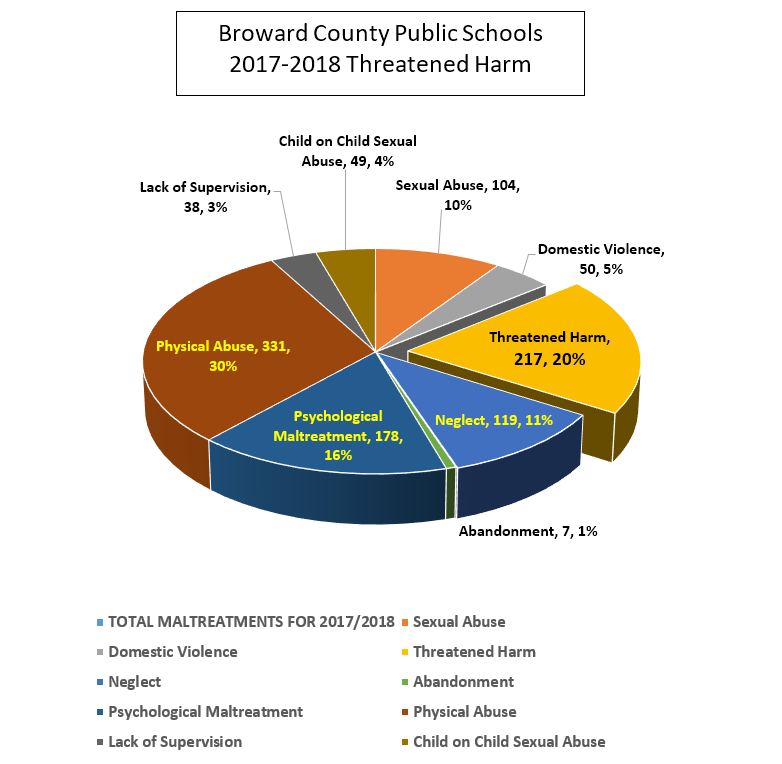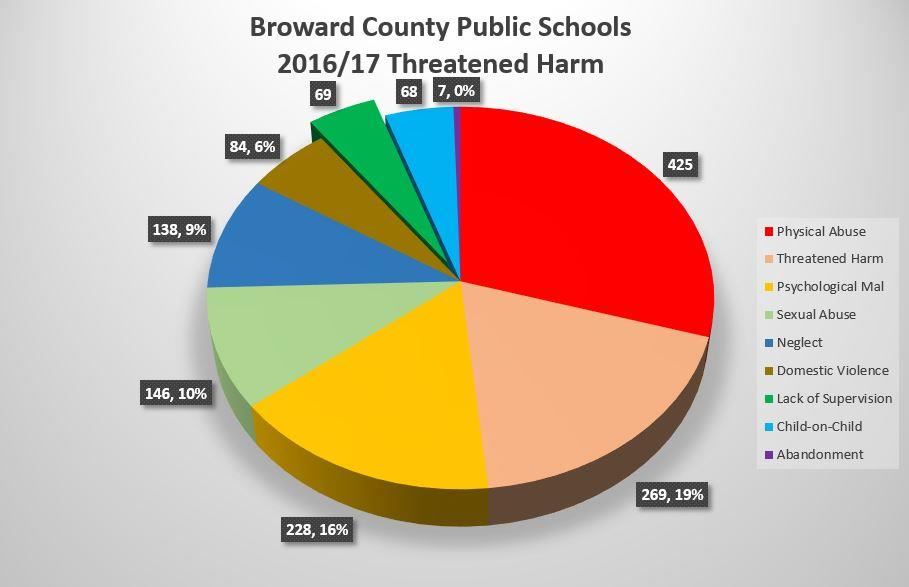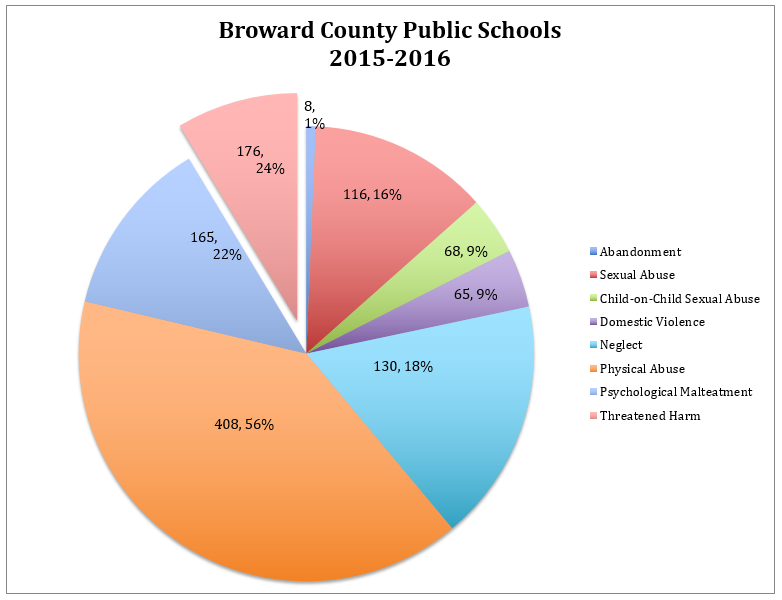Threatened Harm

Threatened Harm
-
Definition
Threatened harm occurs when an adult caregiver makes explicit threats to a child of physical or sexual injury, abandonment, or neglect. It may involve threatened beating, or the use of cruel and unusual punishment for the purpose of inflicting pain without leaving physical marks. It may involve subjecting the child to an unsafe or dangerous environment, such as:
- Exposure to domestic violence
- Living in a “crack” house
- Living in a home with a sexual predator
- Accompanying a caregiver who is engaged in prostitution
- Prostitution of the child, or allowing the child to be used for pornography
- Living in a home with ongoing domestic violence
- Living in a home which is unsafe (rotten floor boards, exposed wiring, insect infestation, human/animal feces on surfaces).
As defined in Florida Statute 39, “harm” to a child’s health or welfare can occur when a caregiver inflicts or allows to be inflicted upon the child physical, mental, or emotional injury.
This may include:
- Many types of physical injury,
- Purposely giving a child poison,
- alcohol, drugs, or other damaging substances,
- Parental alcohol or substance use which puts a child at risk (driving under the influence with a child in the vehicle, leaving alcohol/drugs out where a child may easily access them),
- Leaving a child without appropriate adult supervision or arrangement appropriate for the child’s age or mental or physical condition,
- Inappropriate or excessively harsh disciplinary action.
Harm also includes:
- Committing, or allowing to be committed, sexual battery against the child
- Allowing, encouraging, or forcing the sexual exploitation of a child
- Exploiting a child through causing or allowing the child to suffer, be subject to pain or to health and/or life threatening conditions
- Abandonment
- Neglect
Threatened harm cuts across all categories of child maltreatment.
Threatened harm may also exist in certain circumstances involving gay, lesbian, bisexual and transgendered students. These situations need to be handled with great sensitivity so as to avoid further damage to family relationships.
Students who are gay, lesbian, bisexual or transgendered present special issues related to child abuse, abandonment, or neglect. Sometimes they are targeted by parents or other caregivers for maltreatment as a result of their sexual identity or orientation. When physical injury, emotional damage, or outright abandonment results, these situations fall under the mandatory reporting requirement of Florida Statute 39.201.
Sometimes school personnel are the perpetrators or allow other students or staff to injure or psychologically maltreat the gay, lesbian, bisexual or transgendered student. Criminal and/or civil liability may result. These actions are also in violation of the Code of Ethics of the Education Profession in the State of Florida (State Board of Education Administrative Rule 6B-1.001) and the Principles of Professional Conduct for the Education Profession in the State of Florida (State Board of EducationAdministrative Rule 6B-1.006).
School personnel are required to encourage and support behavior which reflects a feeling for the dignity and worth of all students. School personnel may have their own thoughts and feelings about sexual identity and orientation, but may not act on these thoughts and feelings in ways that discriminate against or disparage students who are gay, lesbian, bisexual or transgendered. School staff should also take care to avoid behaving in ways that cause discomfort or discriminate against families of students when the parents or caregivers are gay, lesbian, bisexual or transgendered. Reference: School Board Policy 4001.1
If you are approached by a student who wishes to talk with you about issues of sexual identity or orientation, please do not turn away. If the student has questions that you cannot answer, or you feel uncomfortable about dealing with the situation on your own, refer the student to student support services personnel: guidance counselor, school social worker, school psychologist, or family counselor. If concerns about possible abuse, abandonment, or neglect are present, you should consult with the child abuse designee at your school to determine whether a mandatory reporting situation exists.
Be discreet and preserve the confidentiality of your contacts with students and families to the extent that you are able by law. If harassment of students is occurring broadly in your classroom, speak with an administrator and student support personnel about providing educational information to your students. If harassment is being targeted toward a particular student by a specific individual or group, contact your administrator immediately for appropriate intervention and support.
-
Indicators
Indicators of threatened harm due to child maltreatment often include:
- Child’s statements of fear or anxiety about going home
For example, a child may make a verbal statement that “My Dad’s gonna kill me!” or “My Mom’s gonna whip me!” after a behavior referral, bus suspension, or other perceived adverse event when a school employee would be contacting the parent. If the employee feels the child’s anxiety or fear is genuine, this situation may constitute reasonable cause to suspect threatened harm and require reporting to the hotline. If the employee does not know the child well enough to gauge the child’s statement in the context of his/her usual response, discreet consultation should be sought with teacher(s) or others with more knowledge. Also, check with the child abuse designee as to whether there is a history of past hotline reports.
- Child’s expressed fear of certain persons
For example, a child is being sent away for vacation or a visit to a relative, and states fear of making the visit due to the presence there of a person who has harmed the child in the past. Ask the child a non-leading question such as “What happened the last time you visited there?” or “What might happen when you go there?” If the child reveals past maltreatment, make the hotline report.
- Child’s report of unusual types of punishment
For example, a child may report being refused food, being locked out of the house, being refused use of a bathroom, being forced to kneel on grains of rice, being locked in a closet, being tied to a chair, being forced to stand with arms held up or out to the side for a protracted period of time as correction for misbehavior or for no reason discernible to the child. This kind or behavior should be reported to the hotline as threatened harm and psychological maltreatment.
- Child’s statements of direct threats of harm made to the child
For example, statements such as “I’ll bash your face into the concrete!” or “I’ll chop off your fingers!”
- Statements of other students, or of parents, neighbors, community members
It is not necessary to have first hand knowledge of threatened harm. If friends, extended family, or other persons contact the school with information about threatened harm, the school employee should give them the Florida abuse hotline number, 1-800-96-ABUSE, and encourage them to call. However, the school employee should also make a hotline report to be sure that the situation is reported. You cannot pass off the mandated obligation to report.
- Reports of a dangerous home environment
For example, domestic violence in the home. See the separate section on domestic violence. Other examples include reports of unsecured guns in the home, reports of parents/caregivers who sell drugs from the home and/or the drugs are accessible to children (out on the table), parents/caregivers who appear under the influence of substances or alcohol and thus unable to properly care for children.
- Observations of a dangerous home environment encountered during home visits made by student support personnel or teachers
For example, home visitors see exposed electrical wiring, rotted out floor boards, human or animal feces on floors or smeared on walls, evident pest infestation in the home.
- Parents/caregivers who come to school or aftercare programs to pick up children and appear to be under the influence of substances or alcohol. Do not release children to anyone in this condition who plans to drive off in a vehicle with the children. Call 911 and then call the Florida abuse hotline: 1-800-96-ABUSE.
-
Data
In the 2017-2018 school year 20 percent of the reports made by Broward County Public Schools employees to the Florida abuse hotline involved threatened harm.



-
Resources
The child abuse designee at your school, by School Board policy, is the person with whom you should communicate regarding suspected threatened harm.
Other persons to contact for assistance or consultation if the child abuse designee is not available include:
- Guidance counselor
- School administrator
- School social worker
- School psychologist
- Family counselor
For situations of imminent threatened harm, when there is risk of significant harm to the child or caregivers, the Florida abuse hotline should be called: 1-800-96-ABUSE.
For risk of immediate or imminent harm, call 911 first and then call the hotline.
If there appears to be some threatened harm of a minor nature that doesn’t rise to the reasonable cause to suspect harm level, prevention may be the most appropriate first intervention. There are many community agencies, as well as the school district, that provide prevention services. Please consult with the school’s child abuse designee or other student support personnel.
Specific Resources for Sexual Identity Issues:
- GLSEN (Gay, Lesbian and Straight Education Network)
- PFLAG (Parents, Families, Friends of Lesbians and Gays) (954) 916-9252
- Project Yes- For Information and Education - (305) 663-7195
- SunServe (Sunshine Social Services, Inc.) - (954) 764-5150
- Safe Schools South Florida - (954) 771-4799
-
TO REPORT CHILD ABUSE, CALL 1-800-96ABUSE

